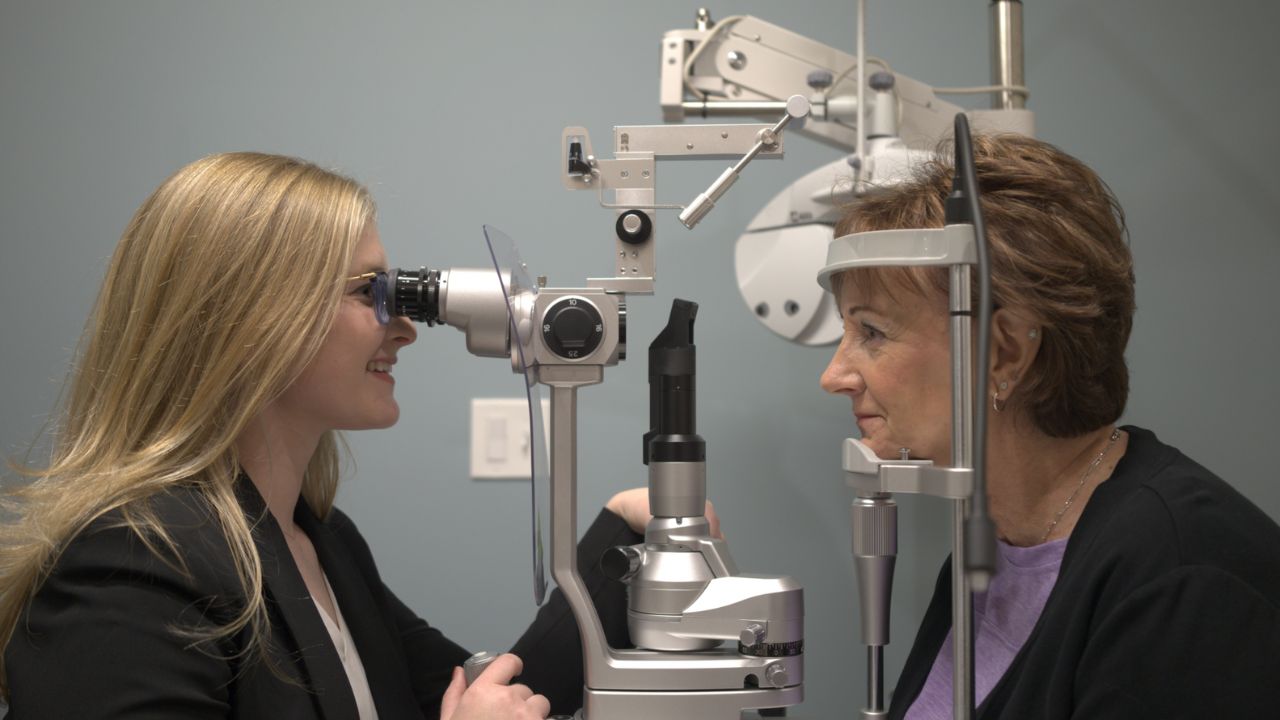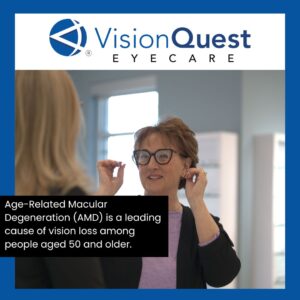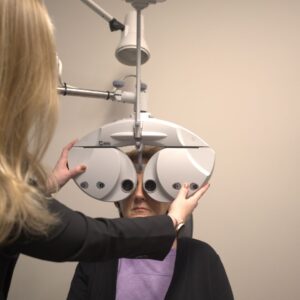Age-Related Macular Degeneration (AMD) is a leading cause of vision loss among people aged 50 and older. This progressive eye condition affects the macula, the part of the retina responsible for clear central vision. As AMD progresses, it can significantly impair everyday activities such as reading, driving, and recognizing faces. At VisionQuest Eyecare, with locations in Greenwood and Fishers, Indiana, we are dedicated to providing comprehensive care for patients with AMD. This article will explore the prevention and management of AMD to help you maintain optimal eye health.
Understanding AMD
AMD comes in two forms: dry (atrophic) and wet (neovascular).
- Dry AMD: This is the most common type, accounting for about 80-90% of cases. It occurs when the macula thins over time, leading to gradual vision loss. It is characterized by the presence of drusen, which are yellow deposits under the retina.
- Wet AMD: Although less common, wet AMD is more severe. It occurs when abnormal blood vessels grow under the retina and macula, leading to leakage of blood and fluid. This can cause rapid and severe vision loss.
Risk Factors for AMD
Several factors increase the risk of developing AMD, including:
- Age: The risk increases significantly after age 50.
- Genetics: A family history of AMD increases the likelihood of developing the condition.
- Smoking: Smokers are at a higher risk of developing AMD compared to non-smokers.
- Obesity: Being overweight can increase the risk of early and intermediate stages of AMD progressing to the advanced stage.
- High blood pressure and cardiovascular disease: These conditions are linked to a higher risk of AMD.
- Diet and nutrition: Poor diet lacking in fruits, vegetables, and essential nutrients can contribute to AMD.
Prevention of AMD
While there is no guaranteed way to prevent AMD, certain lifestyle changes and preventive measures can reduce the risk or slow its progression:
- Regular Eye Exams: Regular comprehensive eye exams can detect early signs of AMD. VisionQuest Eyecare provides thorough eye exams that include tests specifically designed to identify AMD.
- Healthy Diet: Consuming a diet rich in leafy green vegetables, fish, fruits, and nuts can provide essential nutrients that support eye health. Omega-3 fatty acids, antioxidants like vitamins C and E, zinc, and lutein are particularly beneficial.
- Quit Smoking: Smoking cessation is one of the most significant steps you can take to reduce your risk of AMD.
- Manage Chronic Conditions: Keeping conditions such as hypertension and cardiovascular disease under control can help reduce the risk of AMD.
- Protect Your Eyes: Wearing sunglasses that block UV rays can protect your eyes from harmful sunlight, which may contribute to AMD.
Management of AMD
If you are diagnosed with AMD, there are several management strategies to help slow its progression and manage symptoms:
- Nutritional Supplements: The Age-Related Eye Disease Study (AREDS) found that high doses of certain vitamins and minerals can slow the progression of dry AMD. VisionQuest Eyecare can recommend specific supplements based on your needs.
- Anti-VEGF Injections: For wet AMD, treatments such as anti-vascular endothelial growth factor (anti-VEGF) injections can help reduce the growth of abnormal blood vessels and prevent further vision loss.
- Photodynamic Therapy: This treatment involves using a light-activated drug to destroy abnormal blood vessels in the eye.
- Laser Therapy: In some cases, laser therapy can be used to destroy abnormal blood vessels that contribute to wet AMD.
- Low Vision Rehabilitation: VisionQuest Eyecare offers low vision rehabilitation services to help patients make the most of their remaining vision. This includes training on using magnifying devices, adaptive techniques, and other resources to maintain independence.
VisionQuest Eyecare’s Comprehensive Approach
At VisionQuest Eyecare, we provide a comprehensive approach to managing AMD. Our experienced optometrists are equipped with the latest technology to detect and monitor AMD. We offer personalized treatment plans tailored to each patient’s needs, ensuring the best possible outcomes.
Regular Monitoring and Follow-Up
Regular monitoring and follow-up appointments are crucial for patients with AMD. These visits allow our optometrists to track the progression of the disease and adjust treatment plans as needed. Early detection and intervention can make a significant difference in preserving vision.
Patient Education and Support
Education is a vital component of our AMD management strategy. We provide patients with detailed information about their condition, treatment options, and lifestyle modifications to support eye health. Our team is committed to offering ongoing support and answering any questions you may have about living with AMD.
Schedule an Appointment
If you are experiencing symptoms of AMD, such as blurred or distorted vision, or if you have a family history of the condition, schedule an appointment with VisionQuest Eyecare today. Our dedicated team in Greenwood and Fishers, Indiana, is here to provide expert care and support to help you maintain healthy vision. Early detection and proactive management are key to preserving your sight.
AMD Prevention and Management
Age-Related Macular Degeneration is a serious eye condition that requires proactive management to slow its progression and maintain quality of life. By understanding the risk factors, taking preventive measures, and seeking comprehensive care from VisionQuest Eyecare, you can protect your vision and continue enjoying the activities you love. Contact us today to learn more about our services and schedule your appointment. Together, we can work towards a future of clear and healthy vision.
For more information or to make an appointment, visit our website at VisionQuest Eyecare.

Dr. Collin Rush is passionate about bringing clear eyesight and better eye health to the community. Having graduated in the top 1% of his class at Indiana University School of Optometry, Dr. Rush primarily focuses on dry eye and keratoconus but is also trained in laser therapies for glaucoma and secondary cataracts.



